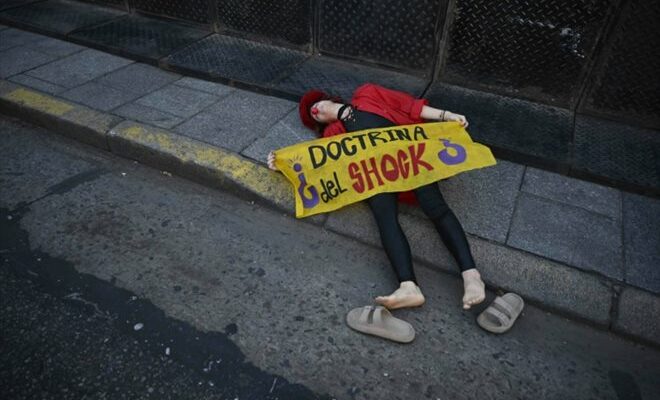Riot police around the Parliament in Buenos Aires, February 2, 2024 (AFP/Luis ROBAYO)
The set of deregulatory reforms of ultraliberal President Javier Milei took a first step on Friday in the Argentine Parliament, which approved it on its “general” principle, without presaging a delicate examination to come in detail, in particular on privatizations and powers delegated to the executive.
After three days of marathon sessions in the hemicycle, against a backdrop of demonstrations – again Friday – and clashes with the police outside, the Chamber of Deputies approved the so-called “Omnibus Law” project by 144 votes for and 109 against .
A symbolic success for President Milei, given his parliamentary minority (3rd force), this approval “in general” is partly due to the numerous concessions made in recent weeks to the pharaonic initial text of the executive, from 664 articles initially, passed to less than half.
The law affects many areas of the public and private spheres, from the electoral system to education, from culture to privatizations, the criminal code, commercial, self-defense, firefighting, divorce, the status of football clubs …
From Tuesday, deputies will examine the reforms in detail then vote “in particular”, theme by theme or even article by article. Many MPs who voted in principle for the law on Friday have announced they will demand additional changes.
Among the highly contentious themes, the temporary delegation of increased powers to the executive, in tax, energy and tariff matters in particular, in the name of “economic emergency”, and privatizations. 41 public companies were initially targeted, but the list has been reduced, and will continue to be debated.
A few hours before the vote, the presidency had ordered the deputies “to show on which side of History they want to be (…) History will judge them according to their work in favor of the Argentines or for the continued impoverishment of the people “.
“The spirit is to support the government and the president so that they have the instruments,” explained Miguel Pichetto, leader of a small moderate (centrist) opposition group, key to Friday’s vote.
– What tolerance for austerity? –
For pollster and analyst Jorge Giaccobe, beyond a certain “theatricalization” of the lively debates in Parliament, “the entire political system is convinced that corrections are necessary to the economy”.
But the key element is “how long will people’s tolerance for the (economic) pain of what Milei proposes to achieve ‘better’ according to him”, he estimates for AFP. “It can last a year. Two years if he scores goals (obtains results). But only six months if there are no goals.”
Because outside Parliament, the most concrete parts of Milei’s austerity measures to date are already biting the purchasing power of millions of Argentines: a 50% devaluation, the end of price controls, and that, in stages, of subsidies for transport and energy.
The presidential spokesperson himself appeared on Friday to play down a possible demise of the bill in the upcoming debates: “the +Basics+ law is part of the path that we are tracing (…), a very important part, without doubt, but that’s not all.
Over the course of the week, the security theme, the executive’s management of public order, took the lead over the legislative process, particularly after Thursday’s clashes between the police and a few hundred demonstrators.
The police used rubber bullets, tear gas and water cannons during clashes and stampedes. Seven police officers were injured, and eight people arrested, according to the executive. At least 15 journalists were hit by rubber bullets, according to press union SiPreBA.

A demonstrator opposed to the policies of Argentine President Javier Milei, in front of Parliament in Buenos Aires, February 2, 2024 (AFP/Luis ROBAYO)
“Repression” for the left opposition, “a few moments of tension”, for Security Minister Patricia Bullrich, who defiantly affirmed that she “would not stop halfway” to resist the ” taken from the streets.”
A few thousand demonstrators were still gathered early Friday evening on Parliament Square, initiating a tense face-to-face and some jostling with the police.
© 2024 AFP
Did you like this article ? Share it with your friends using the buttons below.




